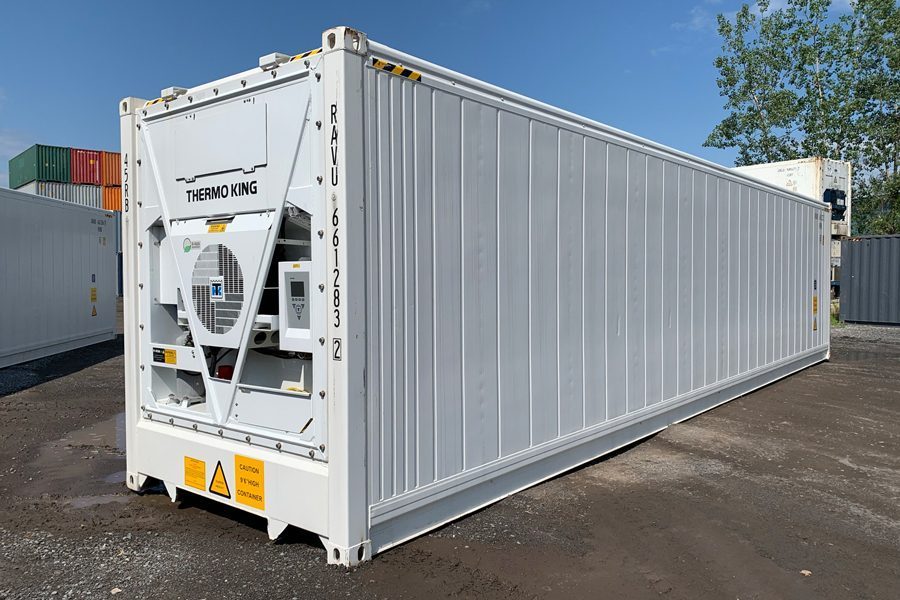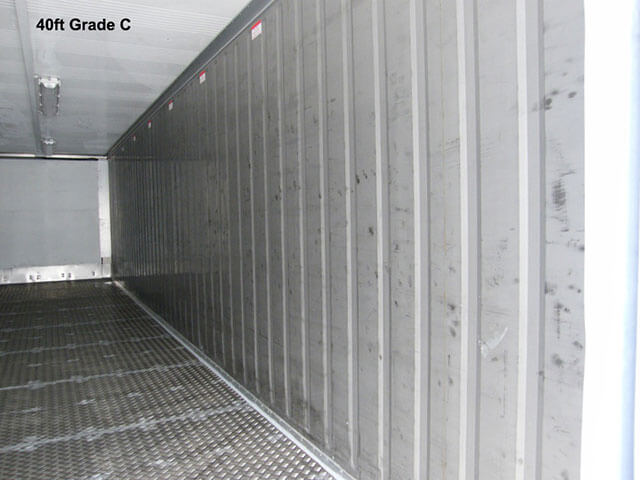All Concerning Freezer Containers: Vital Insights for Your Storage Needs
Freezer containers play a crucial function in the conservation of subject to spoiling products. They come in numerous forms, consisting of cooled and insulated devices, each developed for specific storage space requirements. Comprehending the benefits and crucial features of these containers is important for organizations aiming to maximize their operations. As the demand for efficient storage space services expands, checking out the various choices readily available can result in educated decisions that influence both success and sustainability. What variables should one think about when selecting the appropriate container?
Sorts Of Cold Storage Containers
Freezer containers been available in numerous kinds, each designed to satisfy certain temperature level control demands. Amongst one of the most common types are cooled containers, which preserve temperature levels in between 0 ° C to 10 ° C, making them ideal for perishable goods like fruits, vegetables, and dairy items. One more kind is the deep fridge freezer container, which operates at temperatures listed below -18 ° C, perfect for long-term storage of frozen products such as meats and fish and shellfish.
Shielded containers give temperature level stability without active cooling, making them helpful for short-term transport of temperature-sensitive products. In addition, there are mobile freezer systems, which provide flexibility in locations and are typically used in events or seasonal procedures. Ultimately, blast refrigerators quickly decrease the temperature of warm foods, ensuring safety and security and top quality. Each kind offers an one-of-a-kind objective in numerous markets, from food solution to drugs, stressing the importance of selecting the ideal container for details storage needs.

Advantages of Using Cold Store Solutions

Cool storage space services extend the rack life of items, reducing waste and boosting earnings for companies. By efficiently taking care of supply with correct temperature level control, business can maximize their supply chains and improve operational performance.
Furthermore, freezer centers enable flexible storage space choices, accommodating various volume needs and seasonal variations popular (used 40ft refrigerated shipping containers). This flexibility assists companies react rapidly to market modifications
Employing cold storage solutions can ensure conformity with wellness and safety and security guidelines, protecting both consumers and services. Generally, the strategic use of chilly storage space enhances product administration while promoting sustainability and financial feasibility.
Key Attributes to Search For in Freezer Containers
When selecting cold store containers, a number of crucial functions quality mindful factor to consider to secure peak efficiency and dependability. Initially, temperature level control abilities are vital; containers should maintain consistent temperature levels ideal for certain goods. Insulation quality additionally plays a substantial role, as premium insulation reduces energy usage and enhances temperature level security.
Next, convenience of accessibility and loading is essential; containers should supply straightforward designs for reliable handling and organization. Longevity is another vital aspect; weather-resistant materials ensure longevity and protect contents versus ecological aspects.
Furthermore, movement functions, such as integrated wheels or lifting points, promote transport, while customizable formats allow for tailored storage services.
Last but not least, monitoring systems, including temperature alarm systems and remote tracking, give real-time updates, ensuring that problems remain perfect. By concentrating on these features, customers can pick cold store containers that meet their functional demands successfully.
Choosing the Right Freezer Container for Your Demands
Picking the ideal freezer container requires a thoughtful assessment of particular demands and operational demands. Elements such as the sort of products being stored, temperature sensitivity, and volume should be focused on. Disposable food products may necessitate containers with stringent temperature controls, while pharmaceuticals may require specific problems to keep efficacy.
In addition, prospective customers should take into consideration the container's dimension and wheelchair. A bigger device might be necessary for bulk storage space, while smaller sized, portable options might be optimal for short-lived or on-site demands. Insulation top quality and energy performance are also critical, as these will influence operational prices and temperature stability.
Lastly, compliance with market policies and criteria is important, particularly in fields like food and healthcare. By very carefully examining these elements, users can select a cold storage container that effectively meets their unique demands and assurances optimum storage conditions.
Ideal Practices for Preserving Cold Store Issues
Keeping ideal cool storage space problems is vital for protecting the quality and safety and security of temperature-sensitive items. Regularly keeping track of temperature and humidity degrees is essential; making use of trustworthy digital thermostats and hygrometers can supply accurate readings. Correct insulation of cold storage containers assists minimize temperature fluctuations and energy loss.
Implementing a first-in, first-out (FIFO) system assures that older inventory is used before newer supply, reducing waste (used 40ft refrigerated shipping containers). In addition, keeping an organized format within the storage space enables much better air movement and lessens the threat of cross-contamination
Regular maintenance look at equipment, such as compressors and seals, are essential to avoid malfunctions. Staff training on finest methods for packing and discharging items assists preserve temperature level integrity. Maintaining doors shut as much as possible restrictions warmth exchange, assuring that the chilly storage space atmosphere remains reliable and steady in protecting valuable products.
Price Considerations for Cold Storage Solutions
When reviewing freezer solutions, it is vital to consider the preliminary financial investment costs along with recurring functional expenses. A complete breakdown of these prices can disclose significant long-term savings potential for companies. Comprehending these monetary aspects aids stakeholders make informed choices regarding their freezer requirements.

Preliminary Financial Investment Costs
The financial landscape of cold store containers provides numerous initial investment prices that services must think about. These costs commonly consist of the acquisition or rental rate of the containers, which can differ based upon insulation, dimension, and kind quality. Furthermore, costs connected to retrofitting existing frameworks to suit chilly storage has to be factored in, especially if specialized equipment is needed. Installment prices, consisting of electrical job and refrigeration systems, additionally add to the general first investment. Companies need to not ignore transport prices for delivering containers to their preferred place. Prospective customization choices, such as shelving or temperature tracking systems, can further affect the initial monetary investment. Careful budgeting for these variables is vital for successful cold store execution.
Operational Costs Malfunction
Operational expenses for cold storage space services incorporate numerous crucial price factors to consider that companies should browse. Secret elements consist of power costs, which can be considerable as a result of the requirement to maintain low temperature levels. Maintenance expenses are additionally significant, as routine maintenance is crucial advice to ensure devices runs successfully and continues to be certified with wellness and safety criteria. Additionally, labor prices might develop from the need for specialized team to handle and monitor the storage space atmosphere. Insurance coverage expenditures are an additional consideration, as business must secure their financial investments against possible losses. Lastly, any type of possible governing compliance costs must be factored in, as services may require to purchase systems that abide by food safety and security and ecological policies. Recognizing these costs is crucial for reliable budgeting.
Long-Term Financial Savings Potential
Buying freezer solutions provides substantial lasting cost savings capacity, transforming initial expenses right into financial effectiveness with time. By reducing spoilage and waste, businesses can enhance their earnings margins significantly. Advanced insulation and energy-efficient systems minimize energy expenses, which build up over the life expectancy of the tools. Cold storage space containers often require less frequent maintenance compared to traditional refrigeration methods, leading to reduced fixing expenditures. The capability to store products for extensive durations without compromising top quality enables businesses to profit from market fluctuations, maximizing income. Additionally, the scalability of cold store options makes it possible for business to adjust to altering needs without incurring too much expenses. On the whole, these aspects add to an engaging situation for freezer as an affordable financial investment technique.
Often Asked Inquiries
For How Long Can Food Be Stored in Freezer Containers?
The period food can be kept in chilly storage space containers differs by kind. Usually, subject to spoiling items last from days to weeks, while frozen foods can stay safe for months, relying on appropriate temperature level and storage conditions.
Are Cold Storage Containers Energy-Efficient?
The power performance of cold store containers differs based on style and insulation quality. Modern systems usually make use of sophisticated innovation to decrease power intake, eventually adding to reduced operational prices and ecological influence in long-lasting use.
Can Cold Storage Containers Be Customized for Details Needs?
Cold storage space containers can indeed be personalized to fulfill certain needs. Alterations may include temperature level controls, dimension modifications, and additional features, enabling users to customize options properly for various storage space needs and functional choices.
What Are the Usual Sizes of Cold Store Containers?
Cold store containers link typically are available in standard sizes such as 10, 20, and 40 feet. These dimensions fit different storage needs, ensuring adaptability for services needing go temperature-controlled settings for sensitive products or disposable items.
Do Freezer Containers Require Special Licenses for Use?
Cold store containers often call for unique permits for usage, relying on neighborhood regulations and meant applications. Authorities might mandate licenses to assure safety and security standards, ecological compliance, and correct operational practices are maintained during their application.
Cold storage containers come in different kinds, each designed to meet certain temperature control requirements. In addition, chilly storage space centers allow for adaptable storage space options, suiting different volume demands and seasonal changes in demand. Selecting the right cool storage container needs a thoughtful assessment of functional demands and specific demands. The monetary landscape of cool storage containers presents numerous first financial investment expenses that companies should take into consideration. Cold storage space containers can certainly be tailored to satisfy specific requirements.